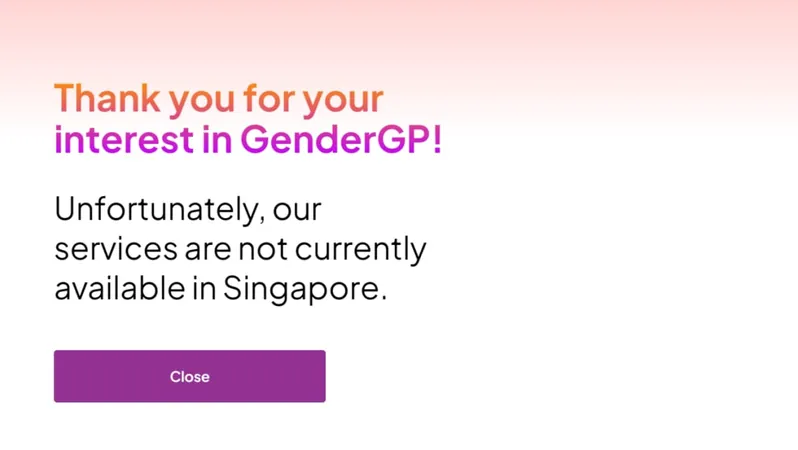
Singapore Shuts Down Controversial Online Gender Clinic GenderGP Over Health Concerns
2024-12-04
Author: Yu
Singapore Shuts Down Controversial Online Gender Clinic GenderGP Over Health Concerns
SINGAPORE: In a significant move to protect public health, Singaporean authorities have blocked access to the online gender clinic GenderGP, citing concerns over the safety and legality of its services. The ban comes as the clinic's practitioners are not registered to practice medicine within Singapore, raising questions over the validity and reliability of the treatment options they offer.
Founded by English doctor Helen Webberley in 2015, GenderGP has gained notoriety for providing teleconsultation services related to gender transition, including hormonal therapies and prescriptions for puberty blockers. However, the Ministry of Health (MOH) and the Infocomm Media Development Authority (IMDA) have stated that GenderGP is not a licensed healthcare provider under Singapore's Healthcare Services Act 2020, which sets stringent rules for medical practices.
Authorities first issued a warning to GenderGP on October 22 after the clinic was found to have provided teleconsultations and prescriptions to a Singapore resident. In their joint statement, the MOH and IMDA emphasized that “GenderGP's services cannot be assured as safe or effective,” as prescriptions issued by foreign doctors are not recognized legally in Singapore. Violating these regulations could result in severe penalties, including fines of up to SGD 100,000 (approximately USD 74,000) and even imprisonment for up to two years.
By December 4, when local media checked the GenderGP website, it displayed a pop-up notification stating: “Unfortunately, our services are not currently available in Singapore.”
GenderGP has faced scrutiny in the United Kingdom as well. Dr. Webberley, initially suspended in 2017 by the UK's General Medical Council due to concerns over her clinical practices, had her medical license revoked in 2023 for failing to meet revalidation requirements. Moreover, investigations have revealed alarming practices by the clinic, including prescribing hormone treatments to minors without parental consent. A viral report from the BBC uncovered a case involving a 15-year-old who received a dangerously high hormone dose without consulting a doctor, igniting political debates in the UK.
The Singaporean authorities reiterated their warning against using GenderGP’s telehealth services, noting the potential risks posed by seeking such treatment without prior medical assessments or necessary examinations. “It is clinically unsafe and inappropriate for persons in Singapore to engage in telehealth services from GenderGP,” they stated firmly.
In the wake of these developments, medical experts and health officials are rallying for stronger regulations surrounding online healthcare services, especially considering the rise of telemedicine amid increasing demand for accessible healthcare options. As the landscape of gender-affirming care continues to evolve globally, Singapore’s decisive action prompts discussions about safety, regulation, and the necessity of local medical oversight in telehealth practices.
Stay tuned as we keep you updated on this rapidly developing story surrounding GenderGP!


 Brasil (PT)
Brasil (PT)
 Canada (EN)
Canada (EN)
 Chile (ES)
Chile (ES)
 España (ES)
España (ES)
 France (FR)
France (FR)
 Hong Kong (EN)
Hong Kong (EN)
 Italia (IT)
Italia (IT)
 日本 (JA)
日本 (JA)
 Magyarország (HU)
Magyarország (HU)
 Norge (NO)
Norge (NO)
 Polska (PL)
Polska (PL)
 Schweiz (DE)
Schweiz (DE)
 Singapore (EN)
Singapore (EN)
 Sverige (SV)
Sverige (SV)
 Suomi (FI)
Suomi (FI)
 Türkiye (TR)
Türkiye (TR)